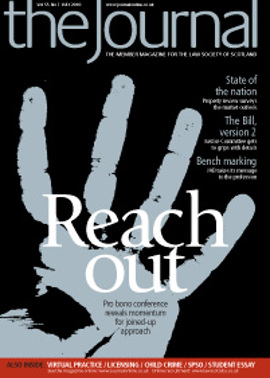Join the cloud

The world of virtual practice is ever changing, and new options are emerging to enable solicitors to share practice costs even from a traditional office.
Just Do Law is the creation of Edinburgh and Glasgow firm Morisons and its IT arm Morisons IT solutions limited (www.m-i-t-s.com), a company set up as Morisons found its clients needing help with IT infrastructure as well as contractual matters, which it could provide by working with a growing network of specialist partner businesses.
In late June, following a pilot scheme tested by a group of lawyers – some redundant, some on maternity leave, together with some trainees and students – Just Do Law was officially launched.
Based on the notion that lawyers want to be freed of administration and compliance work in order to focus on what they trained for, it works as a pay-as-you-go service with a menu of options either as individual components or a complete office support package, depending what the client lawyer (or firm) wishes to do for themselves.
Integral to the system is Lawcloud, case management software provided by LawWare which comes in different versions depending on your type of practice. Lawcloud, along with compliance, website, cashroom, and money laundering components, can be taken out separately or as a £995 a month complete package. Telephone answering is also available at highly competitive rates.
It’s all done through technology the potential of which many lawyers still have only a hazy grasp. Individuals’ computers act as “dumb terminals”, i.e. points of access only, as all data is held on a secure server dedicated to legal practices, with two levels of backup in the case of a failure.
It means that files are accessible to the relevant support service, so that on-the-spot help is available. Under the cashroom service, for example (for which the partner is the business run by former Law Society of Scotland chief accountant Les Cumming), the system can show entries, adjustments, trial balances, do income tax etc, check that cleared funds are available for cheques, and instruct a cheque to print out in the client solicitor’s office. And an accountant is on hand if needed.
Collective strength
Alan Stuart is a Morisons partner and a director of its IT offshoot. With solicitor Raymond McLennan he explained how, in addition to the “laptop lawyer” (another brand name belonging to Morisons’ company), the service can support more traditional firms. One solicitor about to become a sole practitioner due to partner retirals is taking up the full package – instantly achieving a big saving by not replacing his cashier who is also about to retire.
Do you fancy being a “bubble lawyer”? It’s the term for one who works in a firm’s premises but independently under an arrangement to use their facilities, perhaps coming out of the “bubble” if needed to take on some of the firm’s excess work. It’s just one of the ways of working that Just Do Law can readily support.
Stuart, in fact, sees great potential for his firm’s platform supporting the profession as ABS becomes a reality. Cost efficiencies are only part of it: a “community atmosphere” could be generated with the platform as a forum for the exchange of ideas, a chatroom or a locum register (especially suitable for the unemployed).
“Lawyers aren’t very good at business development, but we could hold monthly meetings, show them how to run a business, and provide opportunities for cross pollination.” Perhaps, McLennan added, it could provide the catalyst for the birth of new virtual practices, developing from individuals in different locations sharing files.
In fact, they maintain that the Lawcloud “look and feel” levels the playing field between large and small firms – giving the latter access to similar sophistication to what their bigger cousins can afford.
And, Stuart concludes, in the potential age of Tesco law, is this not what the profession needs in order to respond? After all, how will a Tesco lawyer operate if not through such a platform?
Become a consultant
A different business model again is offered by Mark Harrison of Flexlaw (www.flexlaw.co.uk), formerly known as e-litigate. After over four years operating as a sole practitioner in a virtual environment, he has now realised his ambition to put the IT platform in place to support a consultancy network, and in May took on his first consultant, Claire O’Neill, who logs on to his network and works from her home.
With the infrastructure to support quite rapid expansion, Harrison is now open to approaches from those, probably at senior solicitor through to junior salaried partner level, who have some work following that they can bring to the firm – though this may become less essential in future if the Contact Law client referral service run by Thomson Reuters, which he has found a good source of business since signing up a few weeks ago, continues to bring in a good return.
Having got one consultant up and running, he reckons it will be relatively straightforward to add others. His consultant’s contract and office manual are now in place, the latter covering formatting and saving of documents, time recording, mail, and cashroom, among other things. A day-long session with Claire O’Neill was enough to get her using his system, and he has the ability to deliver remote instruction on her own computer to deal with the relatively few integration issues that have arisen since.
In return for a fixed annual fee to cover outlays such as software licences, and a percentage of the fees billed by the consultant, Harrison provides
the support of being part of a firm (including Master Policy cover), and at the same time the IT platform through which the consultant can work more or less independently. He suggests it is a “risk-free endeavour” for those unsure about the volume of work they will be able to bring, since their dues to the firm are based on the work they fee.
He too has moved into the computer “cloud” – data is now held securely by others and he no longer has to maintain and back up his own servers.
While his practice has been civil court based up to now, and that remains his main focus, Harrison is already in talks with solicitors from other disciplines, and recognises that his set-up allows such lawyers to join, with the possibility of work being cross-referred from one consultant to another as necessary.
His verdict on his experience to date? “I see this as a good example of how a small practice can expand and market in the modern world.”
Fourteen years on
Anyone wondering how to make a virtual practice work should have been at the Society’s conference on 7 May, when English solicitor Andrew Woolley was one of the key speakers.
Woolley’s claim is to have set up the first virtual law firm – back in 1996, when most practices were just waking up to the potential of email and the internet. Not that he is some kind of geek – his presentation was a deliberately provocative, down-to-earth tale from someone who just wants to do the things he likes doing, which in his case means doing lots of talks, and practising as little law as he can.
He also had plenty to say of relevance to those who will be occupying a physical office for the foreseeable. For example, he said that what is more important than how you do business is whether you have a good website – that is, an interactive one and not just a “brochure”. Does it provide answers to questions? Can it do fee quotes? Is there a “contact us” link from every page? Since on his figures about 70% of clients come in via the web, at an average cost to the firm of £9 compared with £600 per client for newspaper advertising, you really want to be able to convert these enquirers into clients.
Also, if you are in an office and want to expand but can’t afford a bigger place, why not get people to work from home? Supervision depends on systems, not presence, he said, pointing to his experience as a junior lawyer when he was basically left to do his own thing. If people show low competence (in terms of the law plus such rules as you choose to judge them by), and low commitment, they have to improve – or else.
Give ’em what they want
This was no technical talk about networks or the like. Just on where his people are (mostly round the Midlands, but spread from Truro to Great Yarmouth to Derby), what they do (family law now – he sold the e-commerce part, would you believe, because Tesco and the like were moving in), and how they work.
As regards this last, Woolley is strong on trusting and incentivising people. “We have total flexi-time and flexi-holidays”, he said. “If you can’t trust them to work the hours, sack them.” In fact, he added, his only problem is making people take their holidays. But his top biller last year had 11 weeks!
Another incentive is offering people a £10,000 bonus to do their own typing (he doesn’t have secretaries, but doesn’t rate digital dictation either). You still save money. And give them a return tied to the value of bills paid.
Woolley is also keen on focusing on what you’re trained to do. So don’t attempt your own marketing (maybe that’s why so many lawyers’ websites are poor). He spends a lot on marketing – 12% of gross fees – but then he doesn’t have offices to pay for. Someone comes in to do his management. He outsources money laundering checks, for about £4 a time, unless it’s high-risk work.
And he gets the money in. Why do we make it hard for clients to pay? he asked. Give them an online facility. He sends bills by email, with a link to click in order to pay – 40% do the same day, and 87% within seven days. That doesn’t include fixed fees paid up front. Not only that, come the autumn he will only be taking on clients who can pay online with a debit card. But he plays hardball with suppliers on payment terms.
Not a man to let doubters stand in his way (especially if the problems they throw up have only a small chance of happening), his solution is simple – you can’t afford to keep them. J D I, one slide proclaimed starkly. Just Do It.
In this issue
- Drop everything
- Free to give
- For the common good
- "Not for the likes of me"?
- RoS fees up for review
- Taking shape
- Criminalising children
- Split decision
- A picture's worth a thousand words
- "Duty to trade" revisited
- Law reform update
- From the Brussels office
- Join the cloud
- Combating claims in interesting times
- Ask Ash
- Party confidential
- What fresh hell is this?
- Links with the past
- Stranger than fiction
- Acts of kindness
- Scottish Solicitors' Discipline Tribunal
- Website review
- Book reviews
- Service driver
- Forecast: cloudy






